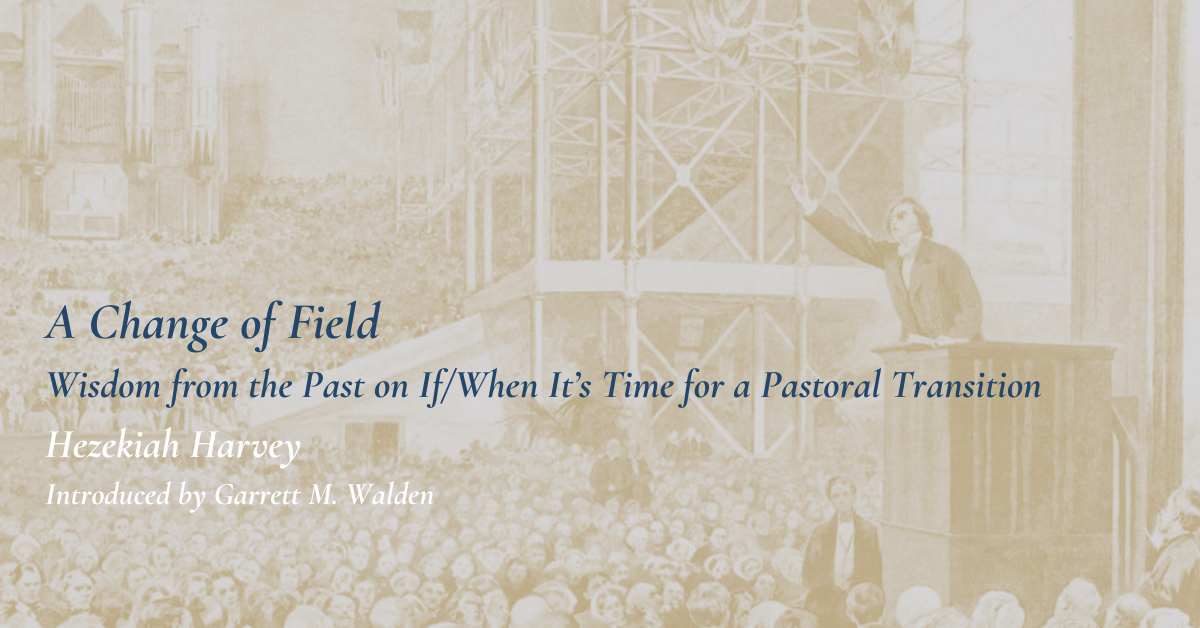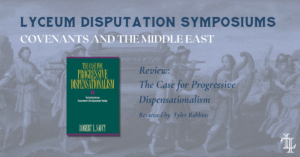I’ve heard from numerous pastor-friends that they’re thinking about leaving their church for this or that opportunity. Sometimes it’s ministry burnout and he wants to change careers entirely; sometimes it’s an opportunity to move toward a healthier church where not everything is a “battle;” sometimes it’s an opportunity to move toward a less healthy church so that he can lead them toward greater maturity. It often has to do with money (which is simply part of life) or title (which may reveal pride in the heart). Most often, however, the pastor’s family is a major factor in an interest to transition from one post to another: “I need to be closer to care for my aging parents,” or “My family is not thriving in this community.” These are all reasonable motivations, but how can a man know if/when it’s time to make a change? If God called you to the pastorate at Church A, how could you know if he is now calling you to Church B? Did God change his mind? Did you misunderstand his call at the outset? Thankfully, there’s wisdom from the past on this question from a lesser-known Baptist figure, Hezekiah Harvey.
Hezekiah Harvey (1821–1893) was born in Hulven, England but spent his entire ministerial career in New York. He was an esteemed professor at Hamilton Theological Seminary (now Colgate University) in Hamilton, New York. Of his few published works, most pertain to the church and pastoral ministry. Below is an excerpt from his book The Pastor: His Qualifications and Duties, which first appeared in 1879.11 Hezekiah Harvey, The Pastor: His Qualifications and Duties (Philadelphia: American Baptist Publication Society, 1904), 120–124. Very minor edits were made to punctuation and formatting. The headings and enumeration are original to Harvey. This excerpt addresses a question many pastors face, about if/when the Lord might be calling them to another place. He doesn’t account for every scenario or answer every question, but there’s deep wisdom and candor here. You’ll notice that two-thirds of the space dedicated to this question pertain to reasons not to move. I judge that by that he means that every pastor’s default should be to stay put. But the remaining one-third elucidates some valid reasons to move, therefore a “change of field” is not necessarily wrong, but it should be rare. John Gill (1697–1771) was fifty-one years the pastor of the church at Carter Lane, but Andrew Fuller (1754–1815) was seven years at Soham before moving to Kettering for the remaining thirty-three years of his life. Faithful men have served long tenures in the same pulpit, and faithful men have made the occasional transition. Harvey’s heart seems to be, find somewhere to settle in for the long haul and don’t let difficulty make you flighty.
CHANGE OF FIELD
Instability in the pastoral office is the common fact and every pastor, sooner or later, meets the question, Shall I change my field? One cause of this is to be found, doubtless, in the restless spirit of the age, which is impatient with the old and ever clamoring for the new. This is specially the case in our country, and is one of the natural results of rapid growth and a widely-diffused spirit of enterprise.
I. EVILS OF CHANGE
The evils of a change of field are many and serious, and only the most imperative reasons will justify a pastor in making it. For,
1. It involves a serious loss in the pastor’s working capital, for the confidence and love of a congregation, which a true minister acquires, constitute a chief element in his power. These, however, unlike mere popularity, are only slowly acquired; but, once secured, they add immensely to the value of his public and private work. But this advantage is all relinquished on leaving the field, and must be again slowly acquired at another post. A pastor’s power also to benefit a people by a wise adaptation of his work to their character and needs must depend largely on his knowledge of them; but in making a change this is lost, and can be regained only by similar study of a new congregation.
2. Few ministers widen their range of original investigation after their first pastorate. At the first post they are compelled to push out into new lines of thought, but in a new field the temptation to use old subjects, if not old sermons, often proves irresistible, and their life-thinking is likely to move round in the same narrow range. Pastoral change often thus checks intellectual and theological growth.
3. This restless expectation of change also discourages broad, comprehensive plans for the instruction and development of the church, and tempts the minister to aim exclusively at immediate results. Hence, his sermons are largely sentimental or sensational, confined within a limited range of topics, and the development of church-life is correspondingly dwarfed.
4. The marked decline in public respect for the ministry is probably in part a result of this feverish restlessness, which weakens confidence in them as men of high, unselfish purpose, and compels a community to regard the minister no longer as a permanent force in its life, but rather as a transient sensation.
II. INADEQUATE CAUSES OF CHANGE
Many causes operate to unsettle a pastor which ought not to produce that result; indeed, some of them, if rightly interpreted, would have served rather to strengthen than to dissolve the pastoral relation. Thus,
1. Mental depression. A sedentary, studious life often induces abnormal nervous conditions, and the hypochondriac misinterprets the feelings of the people and underestimates the results of his ministry. A change is in consequence resolved on, which subsequent developments show to have been wholly unnecessary.
2. The loss of popularity. This is often due to real defects in the character and work of the pastor, and its true remedy is not a change of field, but a correction of his faults. Imperfect preparation has, perhaps, made his sermons commonplace and his pulpit a failure. Or he has failed to cultivate executive, pastoral, and social power, and, as the result, the church is not in effective working condition, and no bonds of personal sympathy and affection bind pastor and people. Or there are imperfection in his spirit and life, and these forbid confidence and respect on the part of the congregation. In all such cases a loss of popularity does not indicate so much a change of field as a change in the spirit, plan, and work of the pastor, for these defects would in any field soon lead to the same result.
3. Difficulties in the church. Such trials enter more or less into every minister’s lot, but they may be no indication of duty to change. The trial may be sent as a discipline, designed to develop, through faith and patience, a nobler character and higher power in the pastor. Change in this case is only a cowardly running away from duty, and consequent failure to gain an intended blessing. Many a disruption of the pastoral tie, it may be feared, is thus only a shrinking from trial and its intended discipline, and results only in loss to pastor and people.
4. Ambitious seeking for distinguished position. There is an unhallowed ambition which, unsatisfied with advancement through natural growth, is ever restlessly seeking, by newspaper notoriety, sensational sermons, and influential friends, to secure prominent places in the ministry. A vacant pulpit in a conspicuous church is usually beset by many such ambitious aspirants for place and notoriety. It is hardly necessary to suggest that such a spirit is at the farthest possible remove from the genuine spirit of the Christian pastor; and in the end it reacts disastrously on the reputation of him who indulges it, for self-seeking and pretence are sure, sooner or later, to be exposed.
III. VALID REASONS FOR CHANGE
A change of field is doubtless sometimes the duty of a pastor, and the providence and Spirit of God, which guided him in forming the pastoral relation, will make equally plain the obligation to dissolve it. Some of the reasons which may require a change are the following:
1. Growth in pulpit and pastoral power beyond the scope of the field. A young man has settled, perhaps, in a circumscribed field. Fidelity in study and labor has developed him, so that his capacity plainly fit him for a wider sphere. If this is made evident by the judgment of his brethren and the providence of God, he is required by duty, alike to his own life-usefulness and to the cause of Christ, to enter the wider field opened before him.
2. The necessities of health in himself or family. The severity of the draft made in this age on the intellect and nerves of a minister may sometimes compel change so as to obtain relief by the more free use of previous pulpit preparations. This, though unfortunate for the intellectual growth of the minister, is still to be chosen rather than broken health. Or the climate may prove unfavorable, and on this account a change be demanded.
3. Inadequate salary. The pecuniary support may be insufficient for the growing needs of the pastor, and a new post with larger salary may be opened to him. Here, however, great care must be taken in scrutinizing motives, for a wealthy church and a large salary have glittering attraction and appeal strongly to mere selfishness. The need of larger income must be real, not fancied.
4. Permanent discomfort and embarrassment in his work. A minister, even after the most conscientious discharge of his duties, will sometimes find controlling influences in the church arrayed against him, or his cherished plans of church work defeated by counter-counsels; so that the pastor and permanent and influential members of the church are in relations wholly incompatible with comfort or efficiency. Now, if these relations cannot be altered, it would seem clearly his duty to leave, and to enter a field where his relations will be congenial and his labors unobstructed.
Finally I suggest: A pastor must expect trials in any church, and commonly, in a change of place, he will only find a change in the form of trial. It is a serious question whether in most instances of change a simple faith in God, a patient forbearance, and a persistence in faithful work would not have avoided the necessity, and added much to the strength of the pastor in the higher development of all the forces of his intellectual, moral, and spiritual nature, and in the enlargement of his influence se a minister of Christ. Certainly the unrest so widely seen now in the ministry argues a great wrong somewhere, either in pastor or in churches, and is serving to deteriorate the character and weaken the influence of both.
[1] Hezekiah Harvey, The Pastor: His Qualifications and Duties (Philadelphia: American Baptist Publication Society, 1904), 120–124. Very minor edits were made to punctuation and formatting. The headings and enumeration are original to Harvey.
Author
-

Garrett Walden (ThM, The Southern Baptist Theological Seminary) is General Editor for Particular Baptist Heritage Books, in addition to serving as an editor for The London Lyceum and Hanover Press. He's also a farmer in Alabama with his wife and five kids, where he continues to serve his church and research early Baptist history and theology.
View all postsRecent Posts




